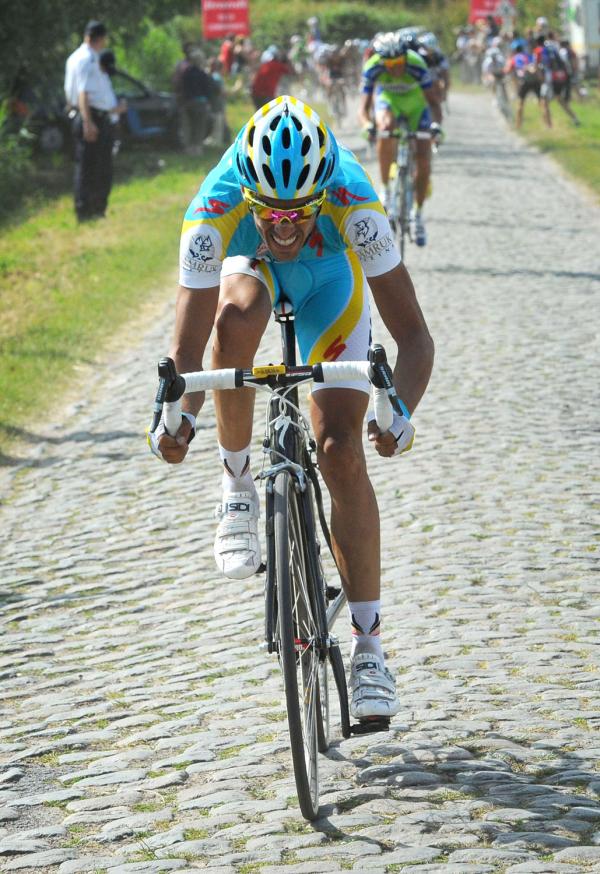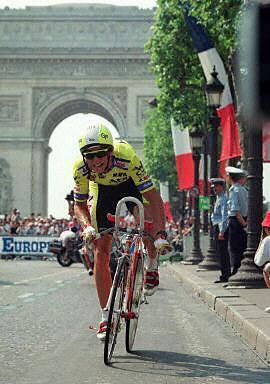Cobblestones, crashes, and potential winners of the Tour
Contador impresses with pavé performance


It has been amazing to watch the carnage that has taken place over the last five days of racing. Having raced for 14 years in the pro peloton, very few things surprise or shock me. This week’s Tour was an exception. After having had my share of crashes during my career I can attest to the pain that results from such accidents.
Crashing on your bike is not like falling down on a snowboard or off a surfboard - it is not onto soft snow or in ocean water. There's usually some contact with the pavement or an obstacle, and that’s not fun. It can rip your skin off, break a couple of bones, or even kill you!
My most unusual crash was in the 1982 Liège-Bastogne-Liège, as a second-year pro. Didi Thurau was the big German star at the time, and I was just the young punk, 20 years old. I started at the back, knowing then that you should be either in the front or back of the peloton. If you were in the middle, you'd be in what I called the dead zone - it was that dangerous.
It was raining and the brakes were not that responsive. Out of my right ear, I could hear someone calling, ‘Greg..Greg...Greg!’ I finally looked over and there was a photographer. I looked back in front of me, then he called me once again and I looked over to give him a smile for the shot.
When I turned back I saw to my horror that the bunch had come to a near stop. I slammed on the brakes, they didn't respond and I went flying into Didi. He went down heavily, breaking his arm, I went down and broke my collarbone. His career was over while mine was just beginning.
We got to the hospital and they needed to get my jersey off. I didn't have much maneuverability and so the easiest way was for the nurses to just slice it off. However they just kept trying to pull off the jersey, dragging my arm up to do so and putting my shoulder in real agony. I had to finally roar at them to cut it...they wanted to keep it as a souvenir, being big cycling fans. When my wife walked into the ER, she found out where I was by following the sound of my screaming profanities.
Anyway, the inclusion of cobbles was a controversial move in this year’s race, and led to a lot of complaints. What people forget is that up until the mid '80s, the Tour regularly featured a Paris-Roubaix-like stage. By the time I raced in the Tour I had already competed in three Paris-Roubaix races.
One difference between then and now is the fact that many of the current Tour riders have no experience on the cobbles. But when I started racing, the fascination with cycling wasn't just the Tour de France. It was the photos of the Tour of Flanders and Paris-Roubaix which hit my imagination. That was a big part of the romance of the sport. And that’s why, just after the first Junior Worlds I rode, I jumped at the chance to go race in Europe with Kent Gordis. We were competitors in my first year of racing, but by this time we were friends.
I won two races in Switzerland, then two in France, and then I went to Belgium to do about eight races. There, I competed on cobbles for the first time, having deliberately targeted those events due to the romantic image surrounding them.
I did two or three races with cobblestones and won two of them. A stretch of cobbles was like climbing a steep, short hill; the faster you ride over them, the smoother it was, and so when we reached the pavé section, we hammered it going into them and until we got out the other side. They were also very technical as you had to look ahead and pick your line, reading what the cobblestones were like. You'd have to avoid the sharp stones, jump over the missing ones, and avoid the head of the rider who just fell in front of you.
Anyway, I found that it was one of the more exciting parts of bike racing. I went on to place fourth twice in Paris-Roubaix, even though I was shattered for days afterwards. I remember not being able to pick up my baby until the Wednesday after one edition of the race.
The dynamics of competition have however now changed and with increased specialisation, you don't see many of the big Tour champions riding Paris-Roubaix. Other riders also give the race a miss, and that’s the reason why so many had no experience of the pavé. This may have contributed to the general apprehension the riders felt before this year’s Tour.
Great riders, regardless of their experience, can however rise above it. A little homework like Contador did in April can also help. The beauty of the sport, cobbles and all, is that when you least expect a big performance from someone, they can pull it out of the bag and that is what happened.
Beforehand everyone was expecting Armstrong and his team to take a minute out of him. But on the day, to everyone’s surprise, Contador did far better than expected and ended up gaining time on Armstrong and many of his other rivals. Only Andy Schleck and Cadel Evans did better, while most of the other favourites actually slipped further back in the general classification relative to him.
With the mountains fast approaching, I think that psychologically that performance left a lot of favourites wondering where they stand. I'm certain a few riders thought that day was a great opportunity to take time out of a guy like Contador, but little did they know that the roles would be reversed. Some of them will be even be asking themselves if they are as good as they think they were going into the race.
That makes for some very interesting racing in the days ahead. The scene is set for a very explosive Tour.
The latest race content, interviews, features, reviews and expert buying guides, direct to your inbox!
Greg LeMond is one of the most important figures in cycling's rich history. A three-time Tour de France winner and double World Champion, LeMond not only reached the pinnacle of his sport, but changed it forever. The first American Tour winner, he brought cycling to new frontiers. A fearless champion of innovation, he ushered in a new era of technological advancement. A stylish and determined rider, he captured the hearts of fans the world over.
Articulate and informed in his opinions, LeMond has always been a forthright advocate of cycling's true values and we are delighted to welcome Greg to the Cyclingnews team for the duration of the Tour de France